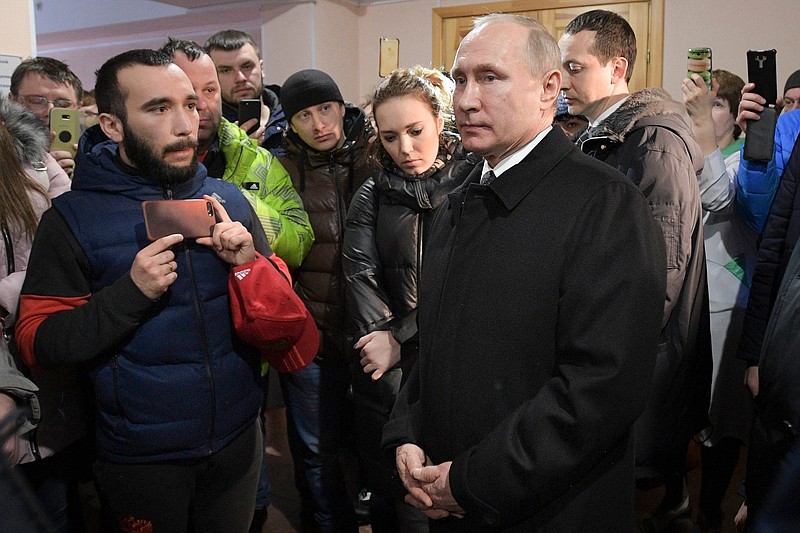Is Putin a CIA Agent?
President Donald Trump's steadfast reluctance to say anything negative about Russia is so striking that a former director of national intelligence, James Clapper, once observed that Vladimir Putin manages Trump as if he were a Russian intelligence "asset." He may be. But if I were a Russian citizen, I'd be asking this question: Is Putin a U.S. agent?
Why? Because Putin has undertaken so many actions in recent years that contributed to the weakening of Russia's economy and human capital base that you have to wonder whether he's secretly on the CIA's payroll.
Beginning around 2007-08, Putin appears to have decided that rebuilding Russia by nurturing its tremendous human talent and strengthening the rule of law was just too hard - it would have required sharing power, holding real, competitive elections and building a truly diverse, innovation-based economy.
Instead, Putin decided to look for dignity for Russia in all the wrong places: by tapping his oil and gas wells, not his people; by strengthening the Russian military, instead of the rule of law; and by enriching himself and his circle of oligarchs while wrapping himself in a cloak of Russian Orthodoxy and Russian nationalism that appealed to his base.
For all his shirtless bravado, and despite all the recent talk about how Putin is proving to be a successful authoritarian, I have one question: Then why is Putin so insecure about his real popularity in Russia that even after nearly 20 years at Russia's helm, he was afraid to allow a single credible independent candidate to run against him in the latest presidential election?
Here's the real truth: Putin consistently acts like a farmer who sells his most valuable beef in return for cubes of sugar. That is, he looks for short-term sugar highs to boost his popularity with his Russian nationalist base, because he is insecure, and pays for it by giving up real beef, leaving Russia weaker in the long term.
Beef for sugar - not a good trade.
For instance, in 2014 Putin seized Crimea and invaded eastern Ukraine with disguised Russian troops - to get a short-term sugar boost with the Russian electorate - and in return, he has had to live with long-term economic banking sanctions imposed by the West that help to slow Russia's growth.
Putin's latest beef-for-sugar trade was his apparent ordering of the use of a military-grade nerve agent, produced only in Russia, to poison the former Russian spy Sergei V. Skripal and his daughter, Yulia, in the English city of Salisbury. The Western response has been what British Prime Minister Theresa May described as the biggest collective expulsion of alleged Russian intelligence officers ever - over 100 from more than 20 countries.
Whether timed or coincidental, the poisoning attack and the Western backlash helped Putin run up his vote totals in his latest phony presidential re-election - another sugar high. But the morning after, Putin's Russia is more isolated than ever.
And then there is Putin's long-range strategy - to bet against Mother Nature, human nature and Moore's Law, all at once. He's betting against Mother Nature - that the world will indefinitely remain addicted to his oil and gas in an age of disruptive climate change. He's betting against human nature - that his young people won't want to be free to realize their full potential, not just live off sugar-high memories of historical greatness. And he's betting against Moore's Law - that the steady growth of technology won't empower Russia's youth to connect and collaborate, and see through his charade.
Putin's troubles are nothing I celebrate. I was against NATO expansion; I wanted Russia integrated into the family of European democracies. A weak, isolated and humiliated Russia is a dangerous animal. But to thrive in the long term, Russia needs a "reset," and it can come only from within, but Putin won't press the button.
It's sad to see a country that gave us Tchaikovsky, Tolstoy, Spassky, Sakharov, Stravinsky, Shiskin, Dostoyevsky, Solzhenitsyn, Pushkin, Nureyev and Google co-founder Sergey Brin become better known for giving the world Novichok, the deadly Russian nerve agent used in Britain; "little green men," the disguised Russian soldiers who seized eastern Ukraine ; and Guccifer 2.0, the Russian cyberagent who hacked the Democratic National Committee in 2016.
It's all beef for sugar - and that's Putin's legacy.
The New York Times
